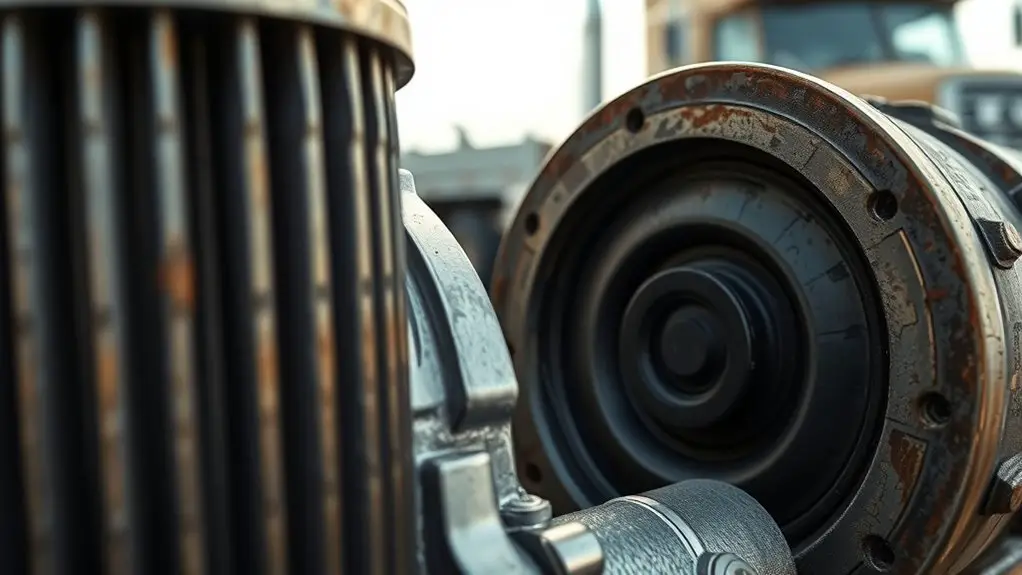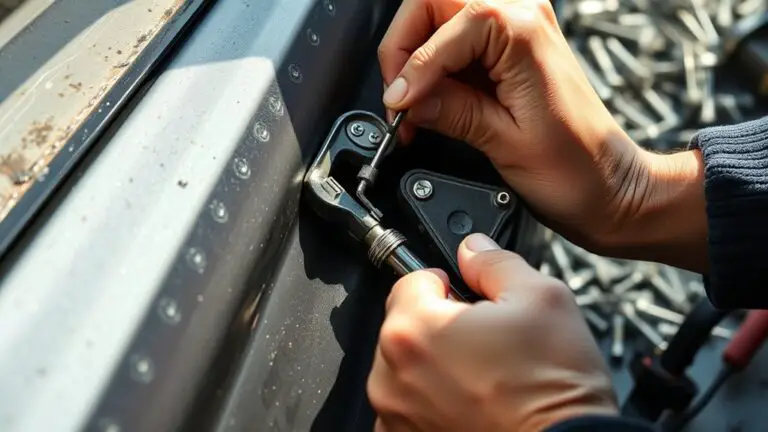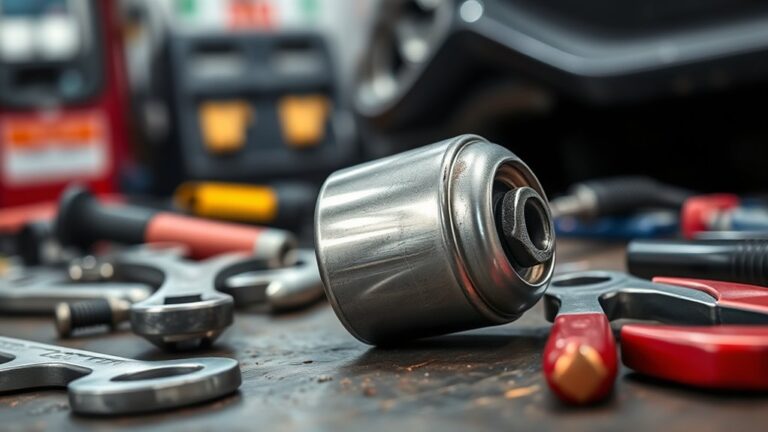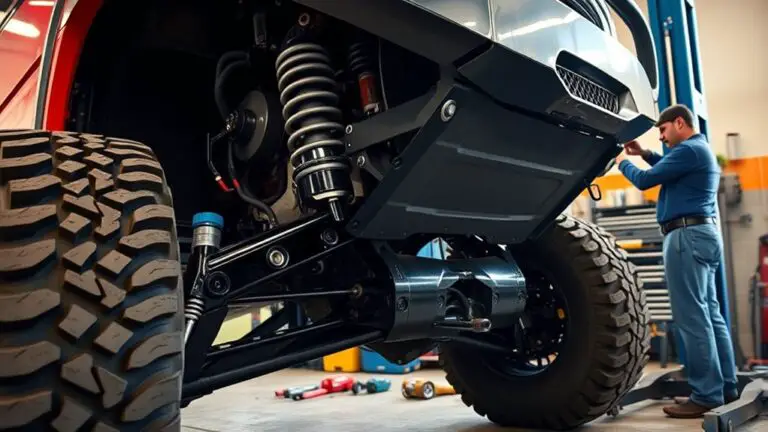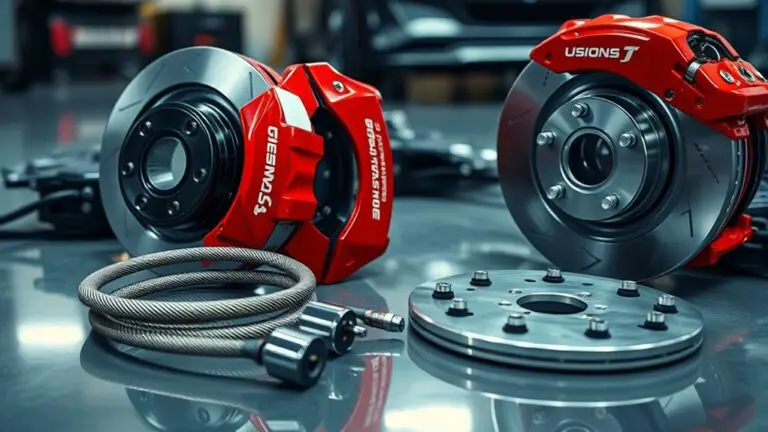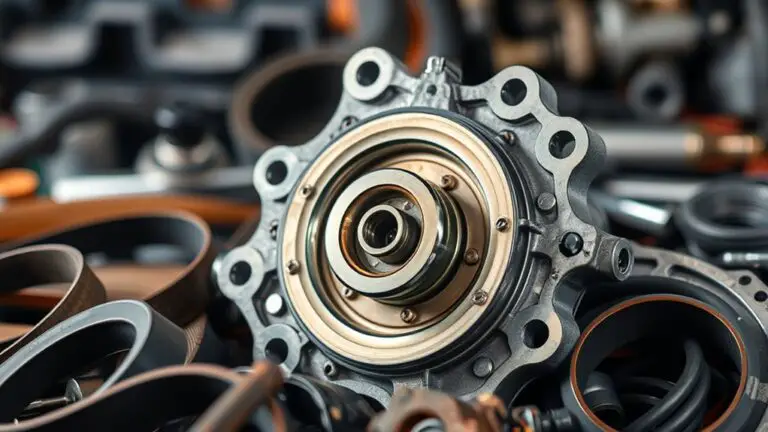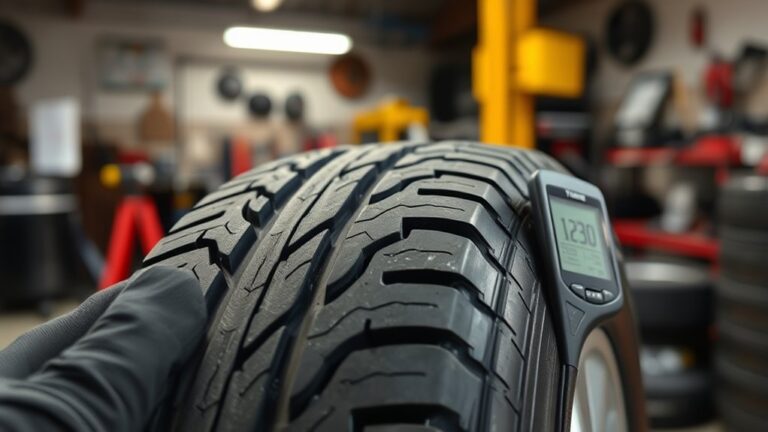How Towing and Load Affect Transmission Filter and Cause Torque Converter Shudder
Towing heavy loads puts immense strain on your transmission system. This increased load can cause contaminants to accumulate in the transmission fluid, leading to a clogged filter. When the filter gets blocked, it restricts fluid flow, resulting in overheating and torque converter shudder. This shudder complicates gear changes and can accelerate wear. Understanding these effects is essential for maintaining performance and longevity. Discover more about preventing these issues and ensuring your transmission’s health.
Understanding the Transmission System

When you think about the transmission system, it’s essential to recognize its critical role in vehicle performance and efficiency. Understanding transmission basics helps you appreciate how this complex system operates, converting engine power into usable torque for your wheels. Fluid dynamics play a crucial role here; the transmission fluid not only lubricates components but also facilitates hydraulic pressure, enabling gear shifts that adapt to driving conditions.
The efficiency of your transmission directly affects fuel consumption, especially under load or during towing. Any imbalance in fluid dynamics can lead to slippage or overheating, ultimately impacting performance. This understanding empowers you to maintain your vehicle better, ensuring you’re not just moving but enjoying the freedom of a well-functioning machine. By grasping these principles, you’re better equipped to make informed decisions about your vehicle’s maintenance and operation, preserving that critical connection between man and machine.
The Role of the Transmission Filter

The transmission filter plays an essential role in maintaining the integrity of your vehicle’s transmission system by removing contaminants from the fluid. If the filter becomes clogged, it can greatly impact performance, leading to overheating and potential damage. Understanding its functionality and the consequences of neglecting it is vital for effective transmission maintenance.
Filter Functionality Importance
Although often overlooked, the transmission filter plays an essential role in ensuring the longevity and efficiency of your vehicle’s transmission system. Proper filter functionality is vital, as it helps maintain ideal fluid conditions. Here’s why it matters:
- Contaminant Removal: The filter traps harmful particles, preventing them from circulating and causing damage.
- Fluid Quality Maintenance: Clean fluid enhances transmission performance and responsiveness.
- Heat Management: A functioning filter aids in regulating temperature, reducing the risk of overheating.
To keep your transmission system performing at its best, prioritize filter maintenance and timely filter replacement. Ignoring these aspects can lead to severe issues down the line. By staying proactive, you can enjoy a smoother driving experience and extend the life of your vehicle’s transmission.
Clogging Impact on Performance
Clogging in the transmission filter can severely compromise your vehicle’s performance. When filters become clogged, they restrict fluid flow, leading to inadequate lubrication and cooling of essential components. This restriction can cause performance issues, including slipping gears, delayed shifting, and increased operating temperatures. As you tow or carry heavy loads, the strain on your transmission increases, exacerbating the impact of clogged filters. If you ignore these symptoms, you risk catastrophic transmission failure, resulting in costly repairs and loss of freedom on the road. Regular maintenance and timely filter replacement are imperative to ensuring peak performance. Don’t let a simple clogged filter dictate your vehicle’s reliability; take proactive measures to safeguard your driving experience.
How Towing Increases Transmission Strain
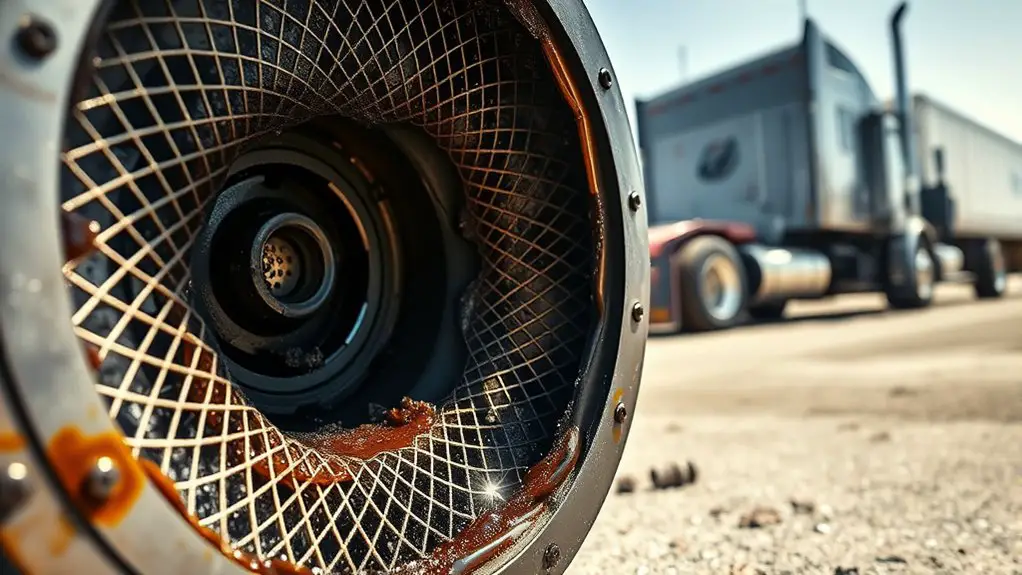
When you tow a heavy load, the additional weight places significant strain on your vehicle’s transmission system. Exceeding your towing capacity can lead to increased transmission wear, compromising performance and longevity.
Consider these factors:
- Heat Generation: Towing elevates transmission temperatures, accelerating fluid breakdown.
- Increased Load: The extra weight forces the transmission to work harder, leading to potential slippage.
- Stress on Components: Over time, the added strain can wear out clutches and gears, resulting in costly repairs.
Understanding how towing affects your vehicle’s transmission is essential for maintaining peak performance. Regularly monitoring your towing limits can help prevent excessive strain and improve your driving experience. By staying within your vehicle’s specifications, you can enjoy the freedom of towing without the worry of damaging your transmission.
Effects of Contaminants in Transmission Fluid
As contaminants infiltrate transmission fluid, they can greatly impair the performance and reliability of your vehicle’s transmission system. Various contaminant types, including dirt, metal shavings, and moisture, work together to accelerate fluid degradation. This degradation reduces the fluid’s ability to lubricate and cool components, leading to increased friction and potential overheating.
When you expose your transmission to harsh conditions, like towing heavy loads, these contaminants can become more pronounced, further compromising fluid integrity. A compromised fluid can lead to erratic shifting, slipping, or even complete transmission failure. Regularly inspecting and replacing your transmission fluid is essential to minimize the effects of these contaminants. By doing so, you maintain peak performance and extend the life of your transmission system, allowing you the freedom to operate your vehicle with confidence, even under demanding conditions. Prioritizing fluid cleanliness is key to ensuring long-term reliability.
Signs of a Clogged Transmission Filter
If you notice reduced fluid flow in your transmission, it could indicate a clogged filter. Additionally, overheating symptoms and grinding or slipping gears are critical signs that warrant immediate attention. Addressing these issues promptly can prevent further damage to your transmission system.
Reduced Fluid Flow
While you may not immediately notice the signs of a clogged transmission filter, reduced fluid flow is often one of the first indicators. This reduction can lead to complications that hinder your vehicle’s performance. You should pay attention to:
- Delayed Shifting: A noticeable lag when shifting gears can signify insufficient fluid flow.
- Erratic Shifting: Unpredictable gear changes might indicate that the transmission isn’t receiving adequate hydraulic pressure.
- Reduced Response: A lack of acceleration response can result from fluid viscosity changes due to clogs.
To maintain peak performance, adhere to your maintenance schedule and consider checking the filter regularly. Ignoring these signs could lead to more severe issues down the line, ultimately compromising your vehicle’s freedom on the road.
Overheating Transmission Symptoms
Reduced fluid flow not only affects shifting but can also lead to overheating within the transmission system. When your transmission overheats, you’ll likely notice signs like a burning smell, unusual noises, or erratic shifting patterns. These symptoms indicate that fluid breakdown is occurring, which compromises lubrication and can cause severe damage over time. If you observe the temperature gauge rising or the transmission fluid appearing dark and gritty, these are critical warning signs of transmission overheating. Ignoring these symptoms can lead to catastrophic failures, costing you both time and money. Regular maintenance, including monitoring fluid condition and replacing clogged filters, is vital to prevent overheating and guarantee your transmission operates efficiently. Stay vigilant to protect your vehicle’s performance.
Grinding or Slipping Gears
When you experience grinding or slipping gears, it often signals a clogged transmission filter that’s restricting fluid flow. This obstruction can lead to inadequate gear engagement, causing the transmission to struggle in maintaining proper operation. As fluid viscosity changes due to contamination, the system becomes less effective, promoting further issues.
Watch for these signs:
- Unresponsive shifts when changing gears
- Increased engine RPMs without corresponding acceleration
- Unusual noise during gear changes
Ignoring these symptoms can lead to severe transmission damage. Regular maintenance of the transmission filter guarantees ideal fluid flow and helps maintain the necessary fluid viscosity, promoting smooth gear engagement. If you notice these issues, consider checking your transmission filter to prevent costly repairs down the line.
The Impact of Overheating on Transmission Performance
Overheating can greatly compromise transmission performance, leading to a cascade of mechanical failures. When transmission overheating occurs, it results in fluid degradation, reducing the efficiency of lubrication and cooling. This degradation can create sludge and varnish, which can clog filters and restrict fluid flow, ultimately impacting shifting quality and responsiveness.
If you’re towing heavy loads or driving under strenuous conditions, the risk of overheating increases considerably. Elevated temperatures can cause seals to deteriorate, leading to leaks and further fluid loss. Consequently, your transmission may struggle to maintain proper pressure, which can manifest as erratic shifting or increased wear on internal components.
To guarantee peak performance, monitor your transmission temperature regularly, especially under heavy loads. By addressing overheating proactively, you can preserve transmission integrity and longevity, allowing for a more enjoyable driving experience.
What Is Torque Converter Shudder?
Towing heavy loads or operating under extreme conditions can lead to various transmission issues, including a phenomenon known as torque converter shudder. This occurs when the torque converter, responsible for transferring power from the engine to the transmission, fails to engage smoothly. You might experience noticeable shudder symptoms, which can include:
- A vibration felt throughout the vehicle
- Unusual noises during acceleration
- Intermittent power loss while driving
These symptoms often arise from factors such as inadequate fluid levels, contamination, or wear in the torque converter components. When shudder occurs, it can lead to decreased efficiency and potential long-term damage if not addressed promptly. Recognizing these symptoms early allows you to take necessary actions, ensuring your vehicle maintains its performance and reliability. Remember, proper maintenance and understanding how loads affect your transmission can help mitigate these issues.
Preventative Measures for Transmission Health
Although transmission issues can arise from various factors, implementing preventative measures is essential for maintaining healthy transmission performance. Regular transmission maintenance is critical; you should check fluid levels and quality routinely. Clean or replace the transmission filter as recommended, as it plays an important role in keeping contaminants at bay.
When it comes to towing, follow specific towing tips to avoid overloading your vehicle. Always adhere to your vehicle’s towing capacity; exceeding this limit can strain the transmission and lead to premature wear. Use a transmission cooler if you frequently tow heavy loads, as it helps manage heat.
Lastly, avoid aggressive driving and sudden acceleration, which can lead to unnecessary stress on the transmission. By taking these proactive steps, you can greatly enhance your transmission’s lifespan and performance, ensuring you enjoy the freedom that comes with a well-maintained vehicle.
When to Seek Professional Help
Recognizing the signs that indicate a need for professional assistance is vital for maintaining transmission health. When you experience specific symptoms, it’s important to seek a professional diagnosis to prevent further damage. Here are key indicators you shouldn’t ignore:
- Unusual noises, like grinding or whining, during operation
- Slipping gears or difficulty shifting
- Persistent torque converter shudder, especially under load
Delaying transmission maintenance can lead to costly repairs and decreased vehicle performance. If you notice any of these issues, don’t hesitate to consult a transmission specialist. They can provide the expertise needed to assess your vehicle’s condition accurately. Addressing these signs promptly not only guarantees your vehicle’s reliability but also grants you the freedom to enjoy your driving experience without anxiety. Remember, a proactive approach can save you from significant headaches down the road.
Frequently Asked Questions
Can Towing Damage My Transmission Over Time?
Yes, towing can damage your transmission over time if you exceed your vehicle’s towing capacity. When you tow heavy loads, you increase transmission wear due to higher heat and pressure. This can lead to premature failure of components and reduced efficiency. Regular maintenance, like fluid changes and inspections, is essential to mitigate these risks. By staying within your towing limits, you can help preserve your transmission’s longevity and performance.
How Often Should I Replace My Transmission Filter?
You should replace your transmission filter every 30,000 to 50,000 miles, depending on your vehicle’s specifications and driving conditions. Think of the filter as a guardian, ensuring your transmission operates smoothly. Regular transmission maintenance is essential to extend the filter’s lifespan and prevent costly repairs. If you frequently tow or carry heavy loads, consider more frequent changes to keep your transmission healthy and maintain that sense of freedom on the road.
What Are the Best Practices for Towing Safely?
To tow safely, verify you’re within your vehicle’s towing capacity. Distribute the weight evenly to maintain stability and control. Use a properly rated hitch and secure all loads to prevent shifting during transit. Check tire pressure and verify your brakes are in good condition. Additionally, practice driving with a trailer in a safe environment, allowing you to adapt to the changes in handling and braking dynamics. Always prioritize safety for a worry-free journey.
Does Towing Affect My Vehicle’s Fuel Efficiency?
When you’re towing, it’s like trying to run a marathon with a heavy backpack—your vehicle’s fuel efficiency takes a hit. The towing impact increases engine load, leading to higher fuel consumption, which can greatly lower your fuel economy. Factors such as weight, aerodynamics, and speed all play into this equation. To maximize efficiency, consider lighter loads and maintaining ideal speed, allowing you to enjoy freedom on the road without breaking the bank.
Can a Dirty Filter Cause Engine Performance Issues?
Yes, a dirty filter can greatly impact engine performance. When a filter’s clogged, it restricts airflow or fluid flow, leading to inefficient combustion and subpar transmission performance. You might notice reduced power, sluggish acceleration, or even overheating. This decreased efficiency can strain your engine, affecting overall vehicle reliability. Keeping your filter clean guarantees ideal operation, helping you enjoy the freedom of smooth driving without the hassle of unexpected performance issues.

